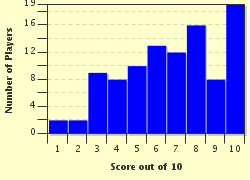Quiz Answer Key and Fun Facts
1. Who was the emperor who created the Xia dynasty, the first ruling house of China?
2. Which philosopher tried to implement "junzi" in Chinese society?
3. Who was the emperor who crowned himself the "First Emperor" and unified the nation, thereby putting an end to the Warring States period?
4. Which philosopher is considered to be the founder of Taoism (or Daoism)?
5. Which emperor was responsible for the Han dynasty's success, and was nicknamed the Martial Emperor?
6. Which general wrote the famed book, "The Art of War"?
7. Who is the person that led a Mongol army into China, ending the rule of the Song dynasty and thereby creating the Yuan dynasty?
8. Who authored the book "Three Principles of the People" and got rid of the dynastic cycle in China?
9. Who proclaimed of the People's Republic of China on October 1, 1949?
10. Which famous person was taught Wing Chun by Yip Man?
Source: Author
bhaila
This quiz was reviewed by FunTrivia editor
bloomsby before going online.
Any errors found in FunTrivia content are routinely corrected through our feedback system.
